▼ 100 more Mumbai locals on the anvil [09-29-17]
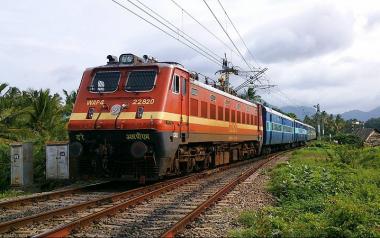 In a major boost to suburban rail services in Mumbai area, Indian Railways is introducing one hundred additional local train services on its Mumbai suburban network of Western Railway and Central Railway zones.
With these additional services, the total suburban services in Mumbai of Western Railway and Central Railway put together will increase from existing 2983 services to 3083 suburban services.
These services will be launched on 29th September 2017.
Out of these 100 services, thirty two new services will be introduced on Western Railway while sixty eight services will be introduced on Central Railway.
‘On Western Railway’, seventeen services will be introduced from 1st October, 2017 in ‘up’ direction and fifteen services will be introduced in ‘down’ direction from 1st October, 2017.
In all, thirty two new services will be introduced in Western Railway.
Western Railway presently runs 1323 sub-urban services. After addition of these services, the total sub-urban services on Western Railway will reach up to 1355.
‘On Central Railway’, fourteen suburban services will be introduced on ‘harbour line’ from 2nd October, 2017, fourteen suburban services will be introduced on ‘trans-harbour line’ from 2nd October, 2017, sixteen suburban services on ‘main line’ will be introduced from 1st November, 2017 and twenty four suburban services on ‘harbour’ and ‘trans-harbour lines’ will be introduced from 31st January, 2018.
In all, sixty eight services will be introduced in Central Railway. Central Railway presently runs 1660 sub-urban services.
After addition of these services, the total sub-urban services on Central Railway will reach up to 1728.
Introduction of these new suburban services will benefit 77 lakh commuters travelling daily over Mumbai suburban network by reducing congestion and providing faster commute. In a major boost to suburban rail services in Mumbai area, Indian Railways is introducing one hundred additional local train services on its Mumbai suburban network of Western Railway and Central Railway zones.
With these additional services, the total suburban services in Mumbai of Western Railway and Central Railway put together will increase from existing 2983 services to 3083 suburban services.
These services will be launched on 29th September 2017.
Out of these 100 services, thirty two new services will be introduced on Western Railway while sixty eight services will be introduced on Central Railway.
‘On Western Railway’, seventeen services will be introduced from 1st October, 2017 in ‘up’ direction and fifteen services will be introduced in ‘down’ direction from 1st October, 2017.
In all, thirty two new services will be introduced in Western Railway.
Western Railway presently runs 1323 sub-urban services. After addition of these services, the total sub-urban services on Western Railway will reach up to 1355.
‘On Central Railway’, fourteen suburban services will be introduced on ‘harbour line’ from 2nd October, 2017, fourteen suburban services will be introduced on ‘trans-harbour line’ from 2nd October, 2017, sixteen suburban services on ‘main line’ will be introduced from 1st November, 2017 and twenty four suburban services on ‘harbour’ and ‘trans-harbour lines’ will be introduced from 31st January, 2018.
In all, sixty eight services will be introduced in Central Railway. Central Railway presently runs 1660 sub-urban services.
After addition of these services, the total sub-urban services on Central Railway will reach up to 1728.
Introduction of these new suburban services will benefit 77 lakh commuters travelling daily over Mumbai suburban network by reducing congestion and providing faster commute.
|
▼ World Gold Council forms a committee to set up India's first spot gold exchange [09-29-17]
 The World Gold Council (WGC) plans to form a committee soon to help set up India's first spot gold exchange within 12 to 18 months.
A dedicated exchange for physical gold is expected to pave the way for standard gold pricing practices in India, apart from bringing in transparency into a market which sees large cash transactions.
The committee, which is likely to be formed in the December quarter, will not set up the exchange.
It will provide guidance in setting up the exchange, he said, while releasing a WGC report highlighting the need for a dedicated spot gold exchange in the country.
In 2015, Indian government had floated the idea of setting up a national gold exchange.
India's push for an exchange follows the gold monetisation and sovereign bond schemes launched in last few years, designed to mobilise the country's gold hoard and reduce imports of the precious metal that weighs on the country's trade deficit.
The Multi Commodity Exchange (MCX) and National Commodity and Derivatives Exchange (NCDEX) currently offer gold futures contracts in India, but do not have a platform for physical trade.
A physical exchange would enable jewellers, retailers, refiners and banks to trade over a regulated platform, the WGC report said.
China, world's top gold consumer, runs such a bourse where gold, both domestically produced and imported, can be bought and sold. The World Gold Council (WGC) plans to form a committee soon to help set up India's first spot gold exchange within 12 to 18 months.
A dedicated exchange for physical gold is expected to pave the way for standard gold pricing practices in India, apart from bringing in transparency into a market which sees large cash transactions.
The committee, which is likely to be formed in the December quarter, will not set up the exchange.
It will provide guidance in setting up the exchange, he said, while releasing a WGC report highlighting the need for a dedicated spot gold exchange in the country.
In 2015, Indian government had floated the idea of setting up a national gold exchange.
India's push for an exchange follows the gold monetisation and sovereign bond schemes launched in last few years, designed to mobilise the country's gold hoard and reduce imports of the precious metal that weighs on the country's trade deficit.
The Multi Commodity Exchange (MCX) and National Commodity and Derivatives Exchange (NCDEX) currently offer gold futures contracts in India, but do not have a platform for physical trade.
A physical exchange would enable jewellers, retailers, refiners and banks to trade over a regulated platform, the WGC report said.
China, world's top gold consumer, runs such a bourse where gold, both domestically produced and imported, can be bought and sold.
|
▼ CARA, WCD Ministry start adoption program Jan Sampark [09-28-17]
 The Central Adoption Resource Authority (CARA) of the Ministry of Women & Child Development has started a monthly “Jan Sampark” program to enable the public to have interaction with its officials and staff for seeking information related to Adoption as well as flagging their concerns.
The first of its kind programme was held in New Delhi on 26th Sept 2017.
Nearly 150 Prospective Adoptive Parents (PAPs), Adoptive Parents and representatives of agencies participated in the session, which lasted for more than four hours.
Details pertaining to Immediate Placement and Special Needs Adoption Module of Child Adoption Resource Information & Guidance System (CARINGS) as well as the newly launched Grievance/Query portal were shared with all the stakeholders.
Also many of the PAPs were counselled and motivated to go for adopting older children.
The event will now be a regular feature every month apart from the quarterly Facebook live chat by CEO CARA. The Central Adoption Resource Authority (CARA) of the Ministry of Women & Child Development has started a monthly “Jan Sampark” program to enable the public to have interaction with its officials and staff for seeking information related to Adoption as well as flagging their concerns.
The first of its kind programme was held in New Delhi on 26th Sept 2017.
Nearly 150 Prospective Adoptive Parents (PAPs), Adoptive Parents and representatives of agencies participated in the session, which lasted for more than four hours.
Details pertaining to Immediate Placement and Special Needs Adoption Module of Child Adoption Resource Information & Guidance System (CARINGS) as well as the newly launched Grievance/Query portal were shared with all the stakeholders.
Also many of the PAPs were counselled and motivated to go for adopting older children.
The event will now be a regular feature every month apart from the quarterly Facebook live chat by CEO CARA.
|
▼ Modernisation of Police Forces umbrella scheme from 2017-2020 [09-28-17]
 The Union Cabinet chaired by the Prime Minister Shri Narendra Modi, has given its approval for implementation of umbrella scheme of “Modernisation of Police Forces (MPF)” for years 2017-18 to 2019-20.
The financial outlay for the scheme over the three year’s period is INR 25,060 crore, out of which the Central Government share will be INR 18,636 crore and the States’ share will be INR 6,424 crore.
Salient Features: The Union Cabinet chaired by the Prime Minister Shri Narendra Modi, has given its approval for implementation of umbrella scheme of “Modernisation of Police Forces (MPF)” for years 2017-18 to 2019-20.
The financial outlay for the scheme over the three year’s period is INR 25,060 crore, out of which the Central Government share will be INR 18,636 crore and the States’ share will be INR 6,424 crore.
Salient Features:
- Special provision has been made under the Scheme for internal security, law and order, women security, availability of modern weapons, mobility of police forces, logistics support, hiring of helicopters, upgradation of police wireless, National Satellite Network, CCTNS project, e-prison project etc.
- Under the umbrella scheme, central budget outlay of INR.10,132 crore has been earmarked for internal security related expenditure for Jammu & Kashmir, North Eastern States and left wing extremism affected States.
- Scheme of Special Central Assistance (SCA) for 35 worst LWE affected districts has been introduced with an outlay of INR 3,000 crore to tackle the issue of underdevelopment in these district.
- An outlay of INR 100 crore has been earmarked in the North Eastern States for police infrastructure upgradation, training institutes, investigation facilities etc.
- Implementation of this scheme would bolster the Government's ability to address challenges faced in different theatres such as areas affected by LWE, Jammu and Kashmir and North East effectively and undertake development interventions which will catalyse in improving the quality of life in these areas and help combat these challenges effectively at the same time.
- New initiatives are being introduced to provide assistance to States for upgradation of police infrastructure, forensic science laboratories, institutions and the equipment available with them to plug critical gaps in the criminal justice system.
- Police Stations will be integrated to set up a national data base of crime and criminals’ records. It will be linked with other pillars of criminal justice system such as ‘prisons, forensic science laboratories and prosecution offices.
- The umbrella scheme also provides for setting up of a State-of Art forensic science laboratory in Amravati, Andhra Pradesh and upgradation of Sardar Patel Global Centre for Security, Counter Terrorism and Anti Insurgency in Jaipur and Gujarat Forensic Science University in Gandhi Nagar.
- It is expected that the umbrella scheme, “Modernisation of Police Forces (MPF)” will go a long way to boost the capability and efficiency of Central and State Police Forces by modernizing them.
|
▼ Karnataka govt launches Vision 2025 for making southern state dream destination! [09-27-17]
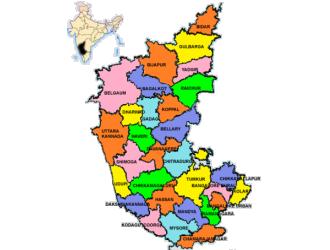 The Karnataka government launched 'Vision-2025' project aimed at evolving a draft policy for development of the state in next seven years by seeking the opinion of the public.
Under the project, the government would seek public opinion on how they want their dream state to be in the next seven years, Chief Minister Siddaramaiah announced.
Officials will collect the required information after discussing with public representatives and the general public.
They will then bring out a draft vision policy for the year 2025, portions of which would be incorporated in the manifesto of ruling Congress.
Launching the website 'www.navakarnataka2025.in',CM indicated this vision document will help the state decide the manifesto of their party.
Executive officer of the project, Renuka Chidambaram, and other officials will tour various parts of the southern state for three months starting from next month and speak to the masses and experts to gather public opinion to build a state of their dream.
Karnataka has started mid-day meal programme and free milk distribution programme to counter malnutrition.
Despite a drought situation for six successive years, migration in the drought-prone areas were almost nil because of the measures taken by the government.
Steps have been taken to improve the agriculture sector under the 'Krishi Bhagya' scheme.
Karnataka will face the Assembly elections early next year. The Karnataka government launched 'Vision-2025' project aimed at evolving a draft policy for development of the state in next seven years by seeking the opinion of the public.
Under the project, the government would seek public opinion on how they want their dream state to be in the next seven years, Chief Minister Siddaramaiah announced.
Officials will collect the required information after discussing with public representatives and the general public.
They will then bring out a draft vision policy for the year 2025, portions of which would be incorporated in the manifesto of ruling Congress.
Launching the website 'www.navakarnataka2025.in',CM indicated this vision document will help the state decide the manifesto of their party.
Executive officer of the project, Renuka Chidambaram, and other officials will tour various parts of the southern state for three months starting from next month and speak to the masses and experts to gather public opinion to build a state of their dream.
Karnataka has started mid-day meal programme and free milk distribution programme to counter malnutrition.
Despite a drought situation for six successive years, migration in the drought-prone areas were almost nil because of the measures taken by the government.
Steps have been taken to improve the agriculture sector under the 'Krishi Bhagya' scheme.
Karnataka will face the Assembly elections early next year.
|
▼ Saubhagya: Pradhan Mantri Sahaj Bijli Har Ghar Yojana launched [09-26-17]
 Modi's government's development and welfarist image underwent a boost by announcing a mega scheme to provide electricity connections to four crore families deprived of regular power.
Modi launched a INR 16,000-crore scheme, Pradhan Mantri Sahaj Bijli Har Ghar Yojana (shortened to Saubhagya, meaning good fortune).
This yojana promises free electricity connections by December 2018. However, customers will have to pay the monthly power bill.
A large number of people lacked electricity connections more than a century after the invention of the incandescent bulb.
Even 70 years after Independence, four crore out of 25 crore families did not have a power connection.
The scheme reflects the Modi government's focus on delivering on schemes like housing, power, loans and farm insurance to key sections of the electorate.
Alongside electrification, the PM Awas Yojana has sanctioned more than 26 lakh houses for the urban poor and more than 1.76 lakh units have been constructed.
Another 11 lakh are being built while two lakh houses are complete under JNNURM.
The total outlay of the project is INR 16, 320 crore while the Gross Budgetary Support (GBS) is INR 12,320 crore.
The outlay for the rural households is INR 14,025 crore while the GBS is INR 10,587.50 crore.
For the urban households the outlay is INR 2,295 crore while GBS is INR 1,732.50 crore. The Government of India will provide largely funds for the Scheme to all States/UTs.
The States and Union Territories are required to complete the works of household electrification by the 31st of December 2018.
The beneficiaries for free electricity connections would be identified using Socio Economic and Caste Census (SECC) 2011 data.
However, un-electrified households not covered under the SECC data would also be provided electricity connections under the scheme on payment of Rs. 500 which shall be recovered by DISCOMs in 10 instalments through electricity bill.
The solar power packs of 200 to 300 Wp with battery bank for un-electrified households located in remote and inaccessible areas, comprises of Five LED lights, One DC fan, One DC power plug. It also includes the Repair and Maintenance (R&M) for 5 years.
Outcomes of the Scheme
The expected outcome of the Scheme is as follows:
a. Environmental upgradation by substitution of Kerosene for lighting purposes
b. Improvement education services
c. Better health services
d. Enhanced connectivity through radio, television, mobiles, etc.
e. Increased economic activities and jobs
f. Improved quality of life especially for women
Technology for the Scheme Modi's government's development and welfarist image underwent a boost by announcing a mega scheme to provide electricity connections to four crore families deprived of regular power.
Modi launched a INR 16,000-crore scheme, Pradhan Mantri Sahaj Bijli Har Ghar Yojana (shortened to Saubhagya, meaning good fortune).
This yojana promises free electricity connections by December 2018. However, customers will have to pay the monthly power bill.
A large number of people lacked electricity connections more than a century after the invention of the incandescent bulb.
Even 70 years after Independence, four crore out of 25 crore families did not have a power connection.
The scheme reflects the Modi government's focus on delivering on schemes like housing, power, loans and farm insurance to key sections of the electorate.
Alongside electrification, the PM Awas Yojana has sanctioned more than 26 lakh houses for the urban poor and more than 1.76 lakh units have been constructed.
Another 11 lakh are being built while two lakh houses are complete under JNNURM.
The total outlay of the project is INR 16, 320 crore while the Gross Budgetary Support (GBS) is INR 12,320 crore.
The outlay for the rural households is INR 14,025 crore while the GBS is INR 10,587.50 crore.
For the urban households the outlay is INR 2,295 crore while GBS is INR 1,732.50 crore. The Government of India will provide largely funds for the Scheme to all States/UTs.
The States and Union Territories are required to complete the works of household electrification by the 31st of December 2018.
The beneficiaries for free electricity connections would be identified using Socio Economic and Caste Census (SECC) 2011 data.
However, un-electrified households not covered under the SECC data would also be provided electricity connections under the scheme on payment of Rs. 500 which shall be recovered by DISCOMs in 10 instalments through electricity bill.
The solar power packs of 200 to 300 Wp with battery bank for un-electrified households located in remote and inaccessible areas, comprises of Five LED lights, One DC fan, One DC power plug. It also includes the Repair and Maintenance (R&M) for 5 years.
Outcomes of the Scheme
The expected outcome of the Scheme is as follows:
a. Environmental upgradation by substitution of Kerosene for lighting purposes
b. Improvement education services
c. Better health services
d. Enhanced connectivity through radio, television, mobiles, etc.
e. Increased economic activities and jobs
f. Improved quality of life especially for women
Technology for the Scheme
- For easy & accelerated implementation of the Scheme , modern technology shall be used for household survey by using Mobile App.
- Beneficiaries shall be identified and their application for electricity connection along with applicant photograph and identity proof shall be registered on spot.
- The Gram Panchayat/Public institutions in the rural areas may be authorised to collect application forms along with complete
- documentation, distribute bills and collect revenue in consultation with the Panchayat Raj Institutions and Urban Local Bodies.
- The Rural Electrification Corporation Limited (REC) will remain the nodal agency for the operationalisation of the scheme throughout the country.
On the occasion of the birth anniversary of Pandit Deendayal Upadhyay, the Prime Minister also dedicated a new ONGC building - the Deendayal Urja Bhawan.
The Prime Minister also dedicated to the nation, the Booster Compressor Facility in Bassein Gas Field.
Increase in renewable power installed capacity, towards the target of 175 GW by 2022 was aimed for.
New India will require an energy framework that works on the principle of equity, efficiency and sustainability. A change in work culture in the Union Government is strengthening the energy sector. This in turn, will positively impact the work culture of the entire country.
|
▼ Pradhan Mantri LPG Panchayat launched [09-25-17]
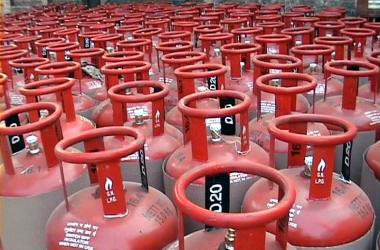 Union minister Dharmendra Pradhan on 23rd Sept 2017 launched the 'Pradhan Mantri LPG Panchayat' from Mota Ishanpur village and handed over free LPG connection to a beneficiary of the Pradhan Mantri Ujjwala Yojana.
Addressing the public, the Petroleum and Natural Gas Minister said his government has so far provided LPG connection to 8.5 crore households in less than three years as against 14 crore connections provided by the Congress government.
Pradhan Mantri LPG Panchayat will aim at spreading awareness among the LPG users about how to properly use the clean fuel and its many benefits.
One lakh LPG Panchayat (to be held across the country) will deal with the issue of safe use of LPG as well as its various benefits, like environment, health, and how it empowers women.
About 40 per cent of Ujjwala Yojana beneficiaries in Gujarat are tribals and Dalits.
The ministry also increased LPG distribution centres, with 106 new distribution centres added in the last one and half years in Gujarat alone.
LPG Panchayat: Know More Union minister Dharmendra Pradhan on 23rd Sept 2017 launched the 'Pradhan Mantri LPG Panchayat' from Mota Ishanpur village and handed over free LPG connection to a beneficiary of the Pradhan Mantri Ujjwala Yojana.
Addressing the public, the Petroleum and Natural Gas Minister said his government has so far provided LPG connection to 8.5 crore households in less than three years as against 14 crore connections provided by the Congress government.
Pradhan Mantri LPG Panchayat will aim at spreading awareness among the LPG users about how to properly use the clean fuel and its many benefits.
One lakh LPG Panchayat (to be held across the country) will deal with the issue of safe use of LPG as well as its various benefits, like environment, health, and how it empowers women.
About 40 per cent of Ujjwala Yojana beneficiaries in Gujarat are tribals and Dalits.
The ministry also increased LPG distribution centres, with 106 new distribution centres added in the last one and half years in Gujarat alone.
LPG Panchayat: Know More
- LPG Panchayat will serve as an interactive platform between those who received LPG cylinders under PMUY, officials, LPG distributors and NGOs.
- In one panchayat, around 100 LPG customers of nearby areas will share their experiences with each others. They can also share their problems and suggestions.
- The panchayats will also include safe practices, quality of service provided by distributors and availability of refill cylinders.
|
▼ Ghar Bhi Saaf Pados Bhi Saaf: Delhi's latest swachchta campaign [09-25-17]
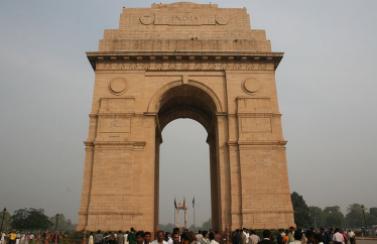 ‘Swachhat Hi Sewa’ campaign at Bhikaji Cama Place in South Delhi was marked by sweeping and collecting the litter. Also inaugurated were modern litter pickers imported by South MCD.
Prime Minister Shri Narendra Modi has been piloting Swachh Bharat Mission has resulted in an unprecedented ‘individual connect’ with sanitation across the country.
This has led to construction of about five crore toilets across the country including over 38 lakh in urban areas in a short span of three years.
People have a better connect with immediate neighborhood, and so the Ministry unveiled ‘My Home-My Neighborhood’ (Ghar Bi Saaf-Pados Bhi Saaf) campaign with the following six components:
1. Segregation of waste at source
2. Compost making from wet waste within the premisesneighborhood/area
3. Recycling of dry waste
4. Freeing the neighborhood from open defecation and open urination
5. Motivating the residents of neighborhood against throwing garbage in open spaces; and
6. Adopting a near by park or open place for collection and waste segregation.
Neighborhood action plan leads to substantial reduction in the quantum of solid waste sent to landfill besides enabling better performance of Waste-to - Compost and Waste-to-Energy plants. Neighborhood could be a residential housing society, a colony,mohalla, market area etc.
Neighborhood action plan will be launched in all the cities and towns across the country on the occasion of the third anniversary of Swachh Bharat Mission on the second of next month. ‘Swachhat Hi Sewa’ campaign at Bhikaji Cama Place in South Delhi was marked by sweeping and collecting the litter. Also inaugurated were modern litter pickers imported by South MCD.
Prime Minister Shri Narendra Modi has been piloting Swachh Bharat Mission has resulted in an unprecedented ‘individual connect’ with sanitation across the country.
This has led to construction of about five crore toilets across the country including over 38 lakh in urban areas in a short span of three years.
People have a better connect with immediate neighborhood, and so the Ministry unveiled ‘My Home-My Neighborhood’ (Ghar Bi Saaf-Pados Bhi Saaf) campaign with the following six components:
1. Segregation of waste at source
2. Compost making from wet waste within the premisesneighborhood/area
3. Recycling of dry waste
4. Freeing the neighborhood from open defecation and open urination
5. Motivating the residents of neighborhood against throwing garbage in open spaces; and
6. Adopting a near by park or open place for collection and waste segregation.
Neighborhood action plan leads to substantial reduction in the quantum of solid waste sent to landfill besides enabling better performance of Waste-to - Compost and Waste-to-Energy plants. Neighborhood could be a residential housing society, a colony,mohalla, market area etc.
Neighborhood action plan will be launched in all the cities and towns across the country on the occasion of the third anniversary of Swachh Bharat Mission on the second of next month.
|
▼ Bharat Ke Kaushalzaade: Skilling programmes beneficiaries honoured [09-25-17]
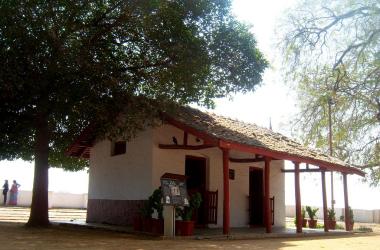 Rural Skills Division, Ministry of Rural Development has organized ‘Bharat ke Kaushalzaade’, an event honouring beneficiaries of its key skilling programmes, on the eve of Antyodaya Diwas 2017.
Staying true to the spirit of Antyodaya Mission, which lies in ‘reaching out to the last person, the event, was graced by almost 800 plus candidates and alumni to celebrate and honour beneficiaries from both of MoRD’s flagship skill development programmes i.e. Deen Dayal Upadhyaya Grameen Kaushalya Yojana (DDU-GKY) and Rural Self Employment Training Institutes (RSETI).
On this day 3 years ago that the Ministry of Rural Development announced DDU-GKY with a focus on building capacity of rural youth to address the needs of domestic and global skills requirements.
Additionally, MoRD has re-energized RSETI through alignment with Common Norms for skills development schemes.
And through sustained efforts and focus on both programmes, the Ministry has successfully skilled 5.05 lakh rural candidates under DDU-GKY and has also been conducting skilling for self-employment through RSETI with a total of 14.09 lakhs candidate skilled and 9.70 lakhs candidates settled till date.
DDU-GKY not only offers industry relevant skill training to candidates, it also works closely with industry and leading corporates to strengthen the post-training employment scenario for its trainees.
A result of this is sustained and fruitful corporate linkages pan-India, with leading names like Pizza Hut, KFC, OCIFIT, Safe Express, Matrix to name a few, whose employees i.e. DDU-GKY alumni participated at the event.
Following training through RSETIs and DDU-GKY, the youth are getting monthly income of INR 10,000 to INR 30,000.
The quality training imparted at these institutes will make them stand not only at Indian job market, but they can also make a mark in foreign countries.
Kaushal Panjee: Know More Rural Skills Division, Ministry of Rural Development has organized ‘Bharat ke Kaushalzaade’, an event honouring beneficiaries of its key skilling programmes, on the eve of Antyodaya Diwas 2017.
Staying true to the spirit of Antyodaya Mission, which lies in ‘reaching out to the last person, the event, was graced by almost 800 plus candidates and alumni to celebrate and honour beneficiaries from both of MoRD’s flagship skill development programmes i.e. Deen Dayal Upadhyaya Grameen Kaushalya Yojana (DDU-GKY) and Rural Self Employment Training Institutes (RSETI).
On this day 3 years ago that the Ministry of Rural Development announced DDU-GKY with a focus on building capacity of rural youth to address the needs of domestic and global skills requirements.
Additionally, MoRD has re-energized RSETI through alignment with Common Norms for skills development schemes.
And through sustained efforts and focus on both programmes, the Ministry has successfully skilled 5.05 lakh rural candidates under DDU-GKY and has also been conducting skilling for self-employment through RSETI with a total of 14.09 lakhs candidate skilled and 9.70 lakhs candidates settled till date.
DDU-GKY not only offers industry relevant skill training to candidates, it also works closely with industry and leading corporates to strengthen the post-training employment scenario for its trainees.
A result of this is sustained and fruitful corporate linkages pan-India, with leading names like Pizza Hut, KFC, OCIFIT, Safe Express, Matrix to name a few, whose employees i.e. DDU-GKY alumni participated at the event.
Following training through RSETIs and DDU-GKY, the youth are getting monthly income of INR 10,000 to INR 30,000.
The quality training imparted at these institutes will make them stand not only at Indian job market, but they can also make a mark in foreign countries.
Kaushal Panjee: Know More
- The event also witnessed the mobilization platform launch, branded ‘Kaushal Panjee’ (Skill Register). It aims to be citizen centric end-to-end solution to aid mobilization of candidates for RSETIs and DDU-GKY.
- It facilitates mobilization of candidates through Self Help Group members, Gram Panchayat Functionaries, Block Officials, CSCs and directly by the candidate.
- RSETIs and DDU-GKY Partners can access the Kaushal Panjee to connect with the mobilized rural youth. Kaushal Panjee is connected to the Social Economic Caste Census (SECC 2011) which will help the States plan and target their mobilizations based on the socio-economic profile of households in their State.
- The re-branding exercise was undertaken by MoRD for Rural Self Employment Training Institutes, wherein a new logo for RSETI was unveiled.
- The logo, depicting ‘reaching for the stars’ aims to portray the RSETI beneficiaries and their achievements.
|
▼ Deendayal Hastkala Sankul opens in Varanasi, UP [09-25-17]
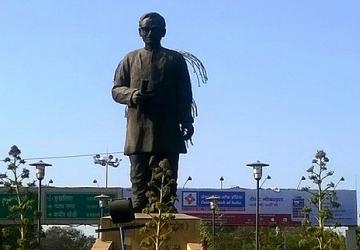 Prime Minister Narendra Modi inaugurated Deendayal Hastkala Sankul, a trade facilitation centre and Crafts Museum for handicrafts at Varanasi, Uttar Pradesh.
The centre and Crafts Museum was proposed by Union Finance Minister in his 2014-15 Budget speech to develop and promote handlooms, handicrafts and silk products.
The centre will facilitate weavers/artisans/exporters in promotion of handlooms and handicrafts in both domestic and international markets.
Moreover, Crafts Museum at the centre will preserve traditional handloom/handicrafts products of Varanasi and showcase handloom & handicraft products.
The centre will help to promote rich traditional craft of ancient Varanasi.
It will provide enabling platform and environment to showcase Indian handloom and handicrafts. It will provide supply chain linkages to domestic and foreign buyers.
Moreover, it will give thrust to domestic and international tourism. It will also give boost to trade and economic development of Varanasi as well as eastern parts of country. Prime Minister Narendra Modi inaugurated Deendayal Hastkala Sankul, a trade facilitation centre and Crafts Museum for handicrafts at Varanasi, Uttar Pradesh.
The centre and Crafts Museum was proposed by Union Finance Minister in his 2014-15 Budget speech to develop and promote handlooms, handicrafts and silk products.
The centre will facilitate weavers/artisans/exporters in promotion of handlooms and handicrafts in both domestic and international markets.
Moreover, Crafts Museum at the centre will preserve traditional handloom/handicrafts products of Varanasi and showcase handloom & handicraft products.
The centre will help to promote rich traditional craft of ancient Varanasi.
It will provide enabling platform and environment to showcase Indian handloom and handicrafts. It will provide supply chain linkages to domestic and foreign buyers.
Moreover, it will give thrust to domestic and international tourism. It will also give boost to trade and economic development of Varanasi as well as eastern parts of country.
|
▼ SATH launched by Niti Aayog in Assam [09-25-17]
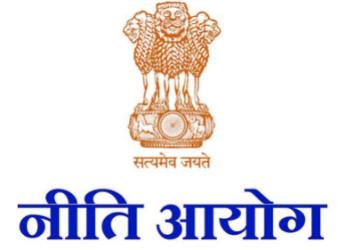 The Department of Health and Family Welfare, Government of Assam and NITI Aayog organized a state consultative workshop today (September 22) in Guwahati.
The consultation marked the launch of program called SATH- Sustainable Action for Transforming Human Capital, a joint initiative of Government of Assam and NITI Aayog, which aims to provide structured support to Assam.
The help is in identifying key health priorities and implement the solutions towards transforming the health and improving the well-being of people of Assam.
The SATH program embodies the philosophy of co-operative federalism.
NITI Aayog selected the three states through a three stage challenge-process - expression of interest, presentations by the states and assessment of commitment to health sector reforms.
Finally, three states: Assam, Uttar Pradesh and Karnataka were chosen based on objective assessment criteria affecting the potential for impact and likelihood of success.
A consortium of reputed technical consultants are closely working with NITI Aayog and the states to conceptualize the initiatives and provide support in the implementation process.
SATH in Assam: Know More The Department of Health and Family Welfare, Government of Assam and NITI Aayog organized a state consultative workshop today (September 22) in Guwahati.
The consultation marked the launch of program called SATH- Sustainable Action for Transforming Human Capital, a joint initiative of Government of Assam and NITI Aayog, which aims to provide structured support to Assam.
The help is in identifying key health priorities and implement the solutions towards transforming the health and improving the well-being of people of Assam.
The SATH program embodies the philosophy of co-operative federalism.
NITI Aayog selected the three states through a three stage challenge-process - expression of interest, presentations by the states and assessment of commitment to health sector reforms.
Finally, three states: Assam, Uttar Pradesh and Karnataka were chosen based on objective assessment criteria affecting the potential for impact and likelihood of success.
A consortium of reputed technical consultants are closely working with NITI Aayog and the states to conceptualize the initiatives and provide support in the implementation process.
SATH in Assam: Know More
- The reforms suggested through this workshop and the SATH program overall will follow a systems approach, rather than a systematic approach, and there will be focus on improving infrastructure and strengthening human resources to achieve our health objectives.
- This workshop was key to developing partnerships and bringing convergence among different stakeholders working towards the same goal of transforming health outcomes.
- The event saw participation of over 100 people including experts from development organizations such as World Bank, World Health Organization, UNDP, UNICEF and World Health Partners, officials, stakeholders and private partners from Assam’s public health system, and healthcare representatives from several districts of Assam.
- While NITI will be an enabler, leaders from within the state system will be created. These leaders can be from any designation or position, but will be those who are committed to tangible change.
- The prosperity of Assam is key to a prosperous India in 2022, a critical milestone for achieving progress towards the United Nation’s Sustainable Development Goals.
- The workshop helped identify and build consensus on the priorities, which included strengthening of human resources, improving governance and performance management of the healthcare system, reducing maternal and child mortality especially in remote areas such as tea plantations, improving nutritional status to tackle preventable causes of morbidity and mortality and using health care technology for end-to-end strengthening of the health system.
- The action plans that were created on the priority themes in this workshop will be further detailed, planned implemented in the coming months as part of the SATH initiative.
|
▼ Zero Hunger Programme in three districts of India! [09-20-17]
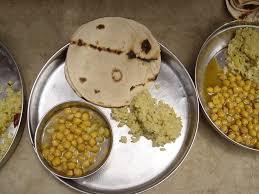 This programme will be launched in addition to what the government has planned to deal with the issue of malnutrition through various other initiatives under its goal to make India malnutrition free by 2022.
Three districts - Gorakhpur in Uttar Pradesh, Koraput in Odisha and Thane in Maharashtra - will initiate India's ambitious 'Zero Hunger' programme through interventions in farm sector on October 16 (World Food Day).
Though many more districts will eventually be covered under this dedicated farm-based programme in sync with India's Sustainable Development Goals (SDGs) to end hunger by 2030, these three would act as a model of an integrated approach to deal with hunger and malnutrition by adopting suitable agricultural\horticultural practices.
The programme will ensure suitable methods of measuring the impact of intervention. There will be intensive training programme in order to identify the nutritional maladies in each district and the appropriate agricultural/horticultural and animal husbandry remedies.
The Programme will be initiated by the Indian Council of Agricultural Research (ICAR) in association with the Indian Council of Medical Research (ICMR), the M S Swaminathan Research Foundation and the Biotechnology Industry Research Assistance Council (BIRAC).
The concerned state governments will also be involved in the programme which consists of organisations of farming system for nutrition, setting up genetic gardens for biofortified plants/crops and initiation of a 'Zero Hunger' training.
A genetic garden for biofortified plants/crops contains the germplasm of naturally biofortified crops or such crops through plant breeding. It has plants and crops that help supplement micro-nutrient deficiencies, including iron, iodine, vitamin A and zinc among others.
MS Swaminathan and Zero Hunger Programme This programme will be launched in addition to what the government has planned to deal with the issue of malnutrition through various other initiatives under its goal to make India malnutrition free by 2022.
Three districts - Gorakhpur in Uttar Pradesh, Koraput in Odisha and Thane in Maharashtra - will initiate India's ambitious 'Zero Hunger' programme through interventions in farm sector on October 16 (World Food Day).
Though many more districts will eventually be covered under this dedicated farm-based programme in sync with India's Sustainable Development Goals (SDGs) to end hunger by 2030, these three would act as a model of an integrated approach to deal with hunger and malnutrition by adopting suitable agricultural\horticultural practices.
The programme will ensure suitable methods of measuring the impact of intervention. There will be intensive training programme in order to identify the nutritional maladies in each district and the appropriate agricultural/horticultural and animal husbandry remedies.
The Programme will be initiated by the Indian Council of Agricultural Research (ICAR) in association with the Indian Council of Medical Research (ICMR), the M S Swaminathan Research Foundation and the Biotechnology Industry Research Assistance Council (BIRAC).
The concerned state governments will also be involved in the programme which consists of organisations of farming system for nutrition, setting up genetic gardens for biofortified plants/crops and initiation of a 'Zero Hunger' training.
A genetic garden for biofortified plants/crops contains the germplasm of naturally biofortified crops or such crops through plant breeding. It has plants and crops that help supplement micro-nutrient deficiencies, including iron, iodine, vitamin A and zinc among others.
MS Swaminathan and Zero Hunger Programme
- It is hoped that such an integrated programme will help us achieve the zero hunger district goal surely and speedily, led by MS Swaminathan who is popularly known as father of 'green revolution' in India.
- The 'Zero Hunger' programme, planned in Koraput, Thane and Gorakhpur districts, will focus on agriculture, nutrition and health in a symbiotic manner: MS Swaminathan
- This programme will be launched in addition to what the government has planned to deal with the issue of malnutrition through various other initiatives under its goal to make India malnutrition free by 2022.
- Under the UN-approved SDGs, which were adopted by countries including India in 2015, the government is expected to ensure sustainable food production systems and implement resilient agricultural practices in the country.
|
▼ The Vijay Mallya Effect: Fugitive Economic Offenders Bill 2017 approved! [09-20-17]
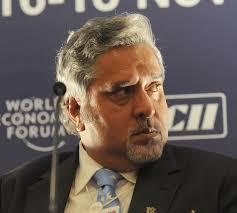 The Union Law ministry has approved Fugitive Economic Offenders Bill, 2017 to empower government to confiscate property of economic offenders and defaulters who flee India.
The Bill seeks to deter economic offenders from evading the process of Indian law by fleeing the country.
It was drafted in pursuance of Finance Minister Arun Jaitley’s 2017-18 Budget speech promising legislative changes or even new law to confiscate the assets of such fugitives.
The Finance Ministry had prepared the draft Cabinet note on the bill and sought the law ministry’s opinion on it.
Features of Bill
It defines fugitive economic offender as any individual against whom warrant for arrest in relation to economic offence has been issued and person has left the country and refuses to return to India to face criminal prosecution.
The burden of proof for establishing that an individual is fugitive economic offender will be on authorities.
The proposed bill will be applicable in cases where the value of offences is over INR 100 crore.
It will allow Financial Intelligence Unit (FIU), the premier technical snoop wing under the finance ministry, to file an application for declaration of fugitive economic offender for confiscation of their assets.
The bill entrusts responsibility to try such cases to the courts under Prevention of Money Laundering Act, 2002 (PMLA).
The bill has provision for appointment of an administrator to dispose off property of fugitive offender to pay off the creditors. Besides, it has provisions to override provisions of other existing laws.
Law ministry wants Saving Clause to be incorporated in the Bill before it is introduced in Parliament. Saving clause provides for certain exception(s) in a statute.
It enables repealed law to be in force with respect to some existing rights as provisions of the proposed bill has bearing on the provisions of existing laws.
The existing laws under which such fugitive economic offender are tried include Recovery of Debts Due to Banks and Financial Institutions Act (RDDBFI), Securitisation and Reconstruction of Financial Assets and Enforcement of Security Interest Act, 2002, (SARFESI) and Insolvency and Bankruptcy Code
Need for this Bill The Union Law ministry has approved Fugitive Economic Offenders Bill, 2017 to empower government to confiscate property of economic offenders and defaulters who flee India.
The Bill seeks to deter economic offenders from evading the process of Indian law by fleeing the country.
It was drafted in pursuance of Finance Minister Arun Jaitley’s 2017-18 Budget speech promising legislative changes or even new law to confiscate the assets of such fugitives.
The Finance Ministry had prepared the draft Cabinet note on the bill and sought the law ministry’s opinion on it.
Features of Bill
It defines fugitive economic offender as any individual against whom warrant for arrest in relation to economic offence has been issued and person has left the country and refuses to return to India to face criminal prosecution.
The burden of proof for establishing that an individual is fugitive economic offender will be on authorities.
The proposed bill will be applicable in cases where the value of offences is over INR 100 crore.
It will allow Financial Intelligence Unit (FIU), the premier technical snoop wing under the finance ministry, to file an application for declaration of fugitive economic offender for confiscation of their assets.
The bill entrusts responsibility to try such cases to the courts under Prevention of Money Laundering Act, 2002 (PMLA).
The bill has provision for appointment of an administrator to dispose off property of fugitive offender to pay off the creditors. Besides, it has provisions to override provisions of other existing laws.
Law ministry wants Saving Clause to be incorporated in the Bill before it is introduced in Parliament. Saving clause provides for certain exception(s) in a statute.
It enables repealed law to be in force with respect to some existing rights as provisions of the proposed bill has bearing on the provisions of existing laws.
The existing laws under which such fugitive economic offender are tried include Recovery of Debts Due to Banks and Financial Institutions Act (RDDBFI), Securitisation and Reconstruction of Financial Assets and Enforcement of Security Interest Act, 2002, (SARFESI) and Insolvency and Bankruptcy Code
Need for this Bill
- In the recent past, there have been instances of big-time offenders, including economic offenders, fleeing the country to escape reach of jurisdiction of Indian courts.
- Most recently, Vijay Mallya, chief of erstwhile Kingfisher Airlines who owes over INR 9,000 crore to various Indian banks, had fled India to escape legal proceedings in connection with the loans.
- Such cases have several deleterious consequences as it hampers investigation in criminal cases, wastes precious time of courts of law and undermines the rule of law of the country.
- The law ministry observed that necessary constitutional safeguards in terms of providing hearing to the person through counsel allowing him time to file a reply, serving notice of summons to him and an appeal to the High Court have been provided for in the bill.
- Also, the bill has provision for appointment of an administrator to dispose off the property to pay off the creditors.
- Besides, the provisions of the proposed law will override provisions of other existing laws.
- In the recent past, there have been instances of big-time offenders, including economic offenders, fleeing the country to escape the reach of the law.
- The finance ministry had in May sought comments from stakeholders on the proposed legislation.
- As per the draft law, a 'fugitive economic offender', means any individual against whom a warrant for arrest in relation to an economic offence has been issued and the person has left the country and refuses to return to India to face criminal prosecution.
- Also, the burden of proof for establishing that an individual is a fugitive economic offender will be on the authorities.
|
▼ Shaheed Gram Vikas Yojana launched in birthplace of Jharkhand freedom fighter Birsa Munda [09-20-17]
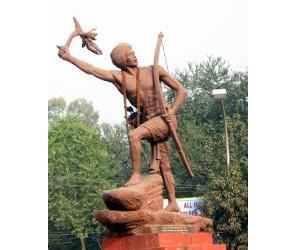 BJP president Amit Shah on 18th Sept 2017 launched the ‘Shaheed Gram Vikas Yojana’ during a programme at Ulihatu in Khunti district of Jharkhand.
Ulihatu is the birthplace of Jharkhand’s tribal icon Birsa Munda.
Shah, on the third day of his Jharkhand visit, also met the descendants of Birsa Munda and gave away gas connections, solar lamps to some of the beneficiaries.
The programme launched by Shah would provide 136 pucca houses to the dwellers of Ulihatu and a couple of other hamlets around it.
The government is providing two-room, a verandah, bathroom and toilet house. BJP president Amit Shah on 18th Sept 2017 launched the ‘Shaheed Gram Vikas Yojana’ during a programme at Ulihatu in Khunti district of Jharkhand.
Ulihatu is the birthplace of Jharkhand’s tribal icon Birsa Munda.
Shah, on the third day of his Jharkhand visit, also met the descendants of Birsa Munda and gave away gas connections, solar lamps to some of the beneficiaries.
The programme launched by Shah would provide 136 pucca houses to the dwellers of Ulihatu and a couple of other hamlets around it.
The government is providing two-room, a verandah, bathroom and toilet house.
|
▼ Swachhta Hi Seva: Cleanliness is Service campaign launched in UP [09-18-17]
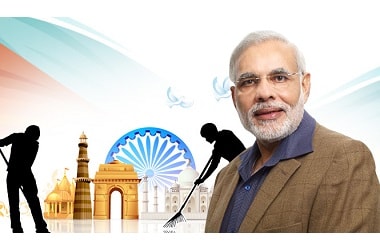 Taking the Central Government’s ambitious cleanliness drive to a higher trajectory, President Ram Nath Kovind today kicked off the fortnight-long 'Swachhta Hi Seva' (Cleanliness is Service) campaign from Uttar Pradesh.
The campaign, aimed at highlighting the Narendra Modi government's flagship cleanliness initiative 'Swachh Bharat Mission', was launched from Ishwari Ganj village near Kanpur.
The president also made people take a pledge to keep their surroundings clean.
President Kovind also had a word of praise for those women who refused to marry into homes without any toilets.
He also appreciated actors Amitabh Bachchan and Akshay Kumar for their support to the cause.
Uttar Pradesh Governor Ram Naik expressed it was more important for a household to have a toilet than a place of worship.
The UP government has been associated with the Swacch Bharat Abhiyan and has constructed 10 lakh toilets so far.
The target is to construct 78 lakh toilets by December 31, 2017 and make the state Open Defecation Free (ODF) by October, 2018.
Total of four districts - Shamli, Bijnor, Hapur and Ghaziabad - had been made open defecation free.
By December 31, 2017, 30 districts would be brought under the ODF category, and by October next year, all the 75 districts in the state will become open defecation free.
The Doordarshan will also broadcast a world premiere of the film 'Toilet: Ek Prem Katha' on September 17.
On October 2, Gandhi Jayanti, which is also the Swachh Bharat Diwas, awards for essays, short film and painting competitions will be given. Taking the Central Government’s ambitious cleanliness drive to a higher trajectory, President Ram Nath Kovind today kicked off the fortnight-long 'Swachhta Hi Seva' (Cleanliness is Service) campaign from Uttar Pradesh.
The campaign, aimed at highlighting the Narendra Modi government's flagship cleanliness initiative 'Swachh Bharat Mission', was launched from Ishwari Ganj village near Kanpur.
The president also made people take a pledge to keep their surroundings clean.
President Kovind also had a word of praise for those women who refused to marry into homes without any toilets.
He also appreciated actors Amitabh Bachchan and Akshay Kumar for their support to the cause.
Uttar Pradesh Governor Ram Naik expressed it was more important for a household to have a toilet than a place of worship.
The UP government has been associated with the Swacch Bharat Abhiyan and has constructed 10 lakh toilets so far.
The target is to construct 78 lakh toilets by December 31, 2017 and make the state Open Defecation Free (ODF) by October, 2018.
Total of four districts - Shamli, Bijnor, Hapur and Ghaziabad - had been made open defecation free.
By December 31, 2017, 30 districts would be brought under the ODF category, and by October next year, all the 75 districts in the state will become open defecation free.
The Doordarshan will also broadcast a world premiere of the film 'Toilet: Ek Prem Katha' on September 17.
On October 2, Gandhi Jayanti, which is also the Swachh Bharat Diwas, awards for essays, short film and painting competitions will be given.
|
▼ Wood is Good Campaign launched by MoEFCC [09-15-17]
The Union Ministry of Environment and Forests and Climate Change (MoEFCC) has launched “Wood is Good” Campaign under Partnership for Land Use Science (Forest-Plus).
It was launched on sidelines of two-day conference on “Sustainable landscapes and forest ecosystems: Theory to Practice” in New Delhi.
Forests are integral part of Indian culture and tradition. Government is committed to increase forest cover from 24% to 33% of geographical area and creating an additional carbon sink of 2.5 to 3 billion tons of CO2 equivalent in forests, as reflected in Internationally Nationally Determined Contributions (INDCs)
Dr. Harsha Vardhan launched the ‘Wood is Good’ campaign on the occasion under the Forest-Plus programme.
The purpose of the campaign is to promote wood as a climate-friendly resource and substitute to materials like steel and plastic as it is a renewable resource, having zero carbon footprint, unlike other materials that leave carbon footprint in their production.
While emphasising on the need to create an enabling environment through small steps such as planting more trees, the ministry also indicated the need for raising the forest cover much beyond the stipulated 33 percent.
Key Objectives of Conference to Launch Scheme - To explore issues and opportunities for ecosystem approach to land management in India.
- To discuss how the approaches and tools developed under the Forest-PLUS programme can be used to improve forest management in India.
- To document and disseminate that learning with a wider group.
About Forest-Plus- The Partnership for Land Use Science (Forest-Plus)is a joint programme by the United States Agency for International Development (USAID) and Ministry of Environment, Forest and Climate Change (MoEF&CC) to strengthen capacity for REDD (Reducing Emissions from Deforestation and Forest Degradation) implementation in India.
- The programme will bring together experts from both India and the United States to develop tools, technologies and methods of forest management in order to meet the technical challenges of managing forests for the health of the ecosystem, carbon stocks, biodiversity and livelihood.
- The REDD Programme is collaborative programme of Food and Agriculture Organization (FAO), United Nations Development Programme (UNDP) and United Nations Environment Programme (UNEP).
- It was created in 2008 in response to UNFCCC decisions on Bali Action Plan and REDD at COP-13. Its goal is to reduce forest emissions and enhance carbon stocks in forests while contributing to national sustainable development.
|
▼ Nobel prize winner Kailash Satyarthi launches anti-child abuse campaign [09-11-17]
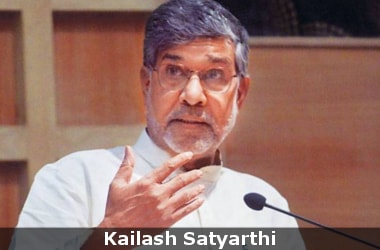 Nobel laureate Kailash Satyarthi is about to launch a new campaign against child abuse and trafficking.
It is a war on rapes, war on child sexual abuse and trafficking because these are not ordinary crimes and they cannot be solved through the business-as-usual approach– these were the Nobel winner's words on the campaign.
Two children are sexually abused every hour.
One child goes missing every eight minutes in India.
These children are trafficked– sold and bought with more than 9,000 children being trafficked in India in 2016, up nearly 25 percent from the previous year, according to the Ministry of Women and Child Development.
About 14,000 children were victims of rape and sexual harassment in 2015, data from the National Crime Records Bureau showed.
But those figures may only be the tip of the iceberg, with experts saying the government underestimates the numbers in a country where a shroud of silence surrounds such crimes.
Satyarthi hopes his "India March", which will kick off from the country's southernmost tip of Kanyakumari and finish in New Delhi on October 16 after travelling across all 29 states and seven union territories, will open people's eyes to the mounting epidemic.
Traffickers lure children, mostly from remote villages, with false promises of jobs before selling them off to brothels, factories or gangs which force them into begging.
The soft-spoken 63-year-old has been at the forefront of the drive against child labour in India, where over 10 million children are engaged in work, according to UNICEF.
He blames India's "failed" law enforcement, weak prosecution and low conviction rates for their plight.
Satyarthi founded Bachpan Bachao Andolan (Movement to Save Childhood) to rescue children working in horrifying conditions.
In 1980 he quit his job as an electrical engineer to take up the cudgels on behalf of India's most vulnerable citizens.
The married father of two recalled his first rescue operation in 1981—at a time when India had no law against child labour.
In 2014 Satyarthi jointly won the Nobel Peace Prize with Pakistani child activist Malala Yousafzai.
His movement has liberated 86,000 children from bonded labour across India and has activist networks in more than 140 countries.
In the 1990s he organised the Global March Against Child Labour, an international coalition of groups aiming to free millions of children from slavery worldwide. Nobel laureate Kailash Satyarthi is about to launch a new campaign against child abuse and trafficking.
It is a war on rapes, war on child sexual abuse and trafficking because these are not ordinary crimes and they cannot be solved through the business-as-usual approach– these were the Nobel winner's words on the campaign.
Two children are sexually abused every hour.
One child goes missing every eight minutes in India.
These children are trafficked– sold and bought with more than 9,000 children being trafficked in India in 2016, up nearly 25 percent from the previous year, according to the Ministry of Women and Child Development.
About 14,000 children were victims of rape and sexual harassment in 2015, data from the National Crime Records Bureau showed.
But those figures may only be the tip of the iceberg, with experts saying the government underestimates the numbers in a country where a shroud of silence surrounds such crimes.
Satyarthi hopes his "India March", which will kick off from the country's southernmost tip of Kanyakumari and finish in New Delhi on October 16 after travelling across all 29 states and seven union territories, will open people's eyes to the mounting epidemic.
Traffickers lure children, mostly from remote villages, with false promises of jobs before selling them off to brothels, factories or gangs which force them into begging.
The soft-spoken 63-year-old has been at the forefront of the drive against child labour in India, where over 10 million children are engaged in work, according to UNICEF.
He blames India's "failed" law enforcement, weak prosecution and low conviction rates for their plight.
Satyarthi founded Bachpan Bachao Andolan (Movement to Save Childhood) to rescue children working in horrifying conditions.
In 1980 he quit his job as an electrical engineer to take up the cudgels on behalf of India's most vulnerable citizens.
The married father of two recalled his first rescue operation in 1981—at a time when India had no law against child labour.
In 2014 Satyarthi jointly won the Nobel Peace Prize with Pakistani child activist Malala Yousafzai.
His movement has liberated 86,000 children from bonded labour across India and has activist networks in more than 140 countries.
In the 1990s he organised the Global March Against Child Labour, an international coalition of groups aiming to free millions of children from slavery worldwide.
|
▼ From sand dunes into farming land: Jordan's Sahara Forest Project [09-11-17]
 Jordan, a water-poor country that is 90% desert, has launched a project to turn its sand dunes into farming land to produce food using sun and sea water.
King Abdullah II and Norway’s Crown Prince Haakon recently attended a ceremony to mark the official opening of the “Sahara Forest Project” near the southern port city of Aqaba.
In the first stage, the project aims to produce up to 130 tonnes of organic vegetables per year from an area the size of four football pitches.
It will use solar panels to provide power and include outdoor planting space, two saltwater-cooled greenhouses, a water desalination unit and salt ponds for salt production.
The project, whose funders include Norway and the European Union, is to be expanded from three hectares to around 200 hectares of desert. Jordan, a water-poor country that is 90% desert, has launched a project to turn its sand dunes into farming land to produce food using sun and sea water.
King Abdullah II and Norway’s Crown Prince Haakon recently attended a ceremony to mark the official opening of the “Sahara Forest Project” near the southern port city of Aqaba.
In the first stage, the project aims to produce up to 130 tonnes of organic vegetables per year from an area the size of four football pitches.
It will use solar panels to provide power and include outdoor planting space, two saltwater-cooled greenhouses, a water desalination unit and salt ponds for salt production.
The project, whose funders include Norway and the European Union, is to be expanded from three hectares to around 200 hectares of desert.
|
▼ EESL launches UJALA scheme in Malaysia's Melaka [09-7-17]
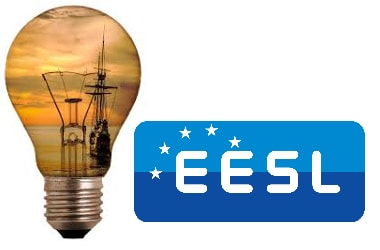 Energy Efficiency Services Limited (EESL), under Ministry of Power, Government of India has launched UJALA (Unnat Jyoti by Affordable Lighting for All) Scheme in the State of Melaka, Malaysia.
The Scheme was launched by Chief Minister of Melaka Datuk Seri Utama Ir. Hj. Idris Bin Hj. Haron.
In due course of time, the successful Indian model of UJALA scheme has become a sought-after example for the different nations of the world and will now be implemented in Melaka to extend programme benefits to people of the region.
Under this scheme, each household in Melaka will get 10 high quality 9-watt LED bulbs at a cost of only RM 10.
The distribution of these LED bulb will take place from 28 numbers of Japerun in the region.
These Japerun are a unique community welfare and engagement centers, which are situated across the Melakan State.
Under the extensive and ever-expanding idea of UJALA, Energy Efficiency Services Limited (EESL) plans to distribute about 1 million 9W
LED bulbs, which will replace 18W CFLs.
The initiative will have the logistical assistance and facilitation support from Green Growth Asia, which is a not for profit organization.
The bulb for the UJALA scheme in Melaka comes with a 3-year free replacement warranty against any technical defects.
UJALA: Know More Energy Efficiency Services Limited (EESL), under Ministry of Power, Government of India has launched UJALA (Unnat Jyoti by Affordable Lighting for All) Scheme in the State of Melaka, Malaysia.
The Scheme was launched by Chief Minister of Melaka Datuk Seri Utama Ir. Hj. Idris Bin Hj. Haron.
In due course of time, the successful Indian model of UJALA scheme has become a sought-after example for the different nations of the world and will now be implemented in Melaka to extend programme benefits to people of the region.
Under this scheme, each household in Melaka will get 10 high quality 9-watt LED bulbs at a cost of only RM 10.
The distribution of these LED bulb will take place from 28 numbers of Japerun in the region.
These Japerun are a unique community welfare and engagement centers, which are situated across the Melakan State.
Under the extensive and ever-expanding idea of UJALA, Energy Efficiency Services Limited (EESL) plans to distribute about 1 million 9W
LED bulbs, which will replace 18W CFLs.
The initiative will have the logistical assistance and facilitation support from Green Growth Asia, which is a not for profit organization.
The bulb for the UJALA scheme in Melaka comes with a 3-year free replacement warranty against any technical defects.
UJALA: Know More
- The Prime Minister of India Sh. Narendra Modi on January 5, 2015 had launched the world's largest and most extensive LED distribution programme, UJALA (Unnat Jyoti by Affordable Lighting for All).
- A simple act of change of one light bulb to LED at South Block Prime Minister's office in India heralded a movement in the entire country for considering the same change.
- Due to bulk LED bulb procurement by EESL, a healthy competition rose among the manufacturers and this brought down the prices of LED bulbs in India from a range of about Rs. 300 - Rs.400 to about Rs. 70 per bulb
- UJALA’s impact in Malaysia will bring about clean energy, contribute to climate change targets and save the already dwindling energy resources.
- With a fairly large switch to LED bulbs, Melaka will be able to reduce carbon emissions by around 19,000 tonnes per year.
- Currently, over 25-crore LED bulbs have been distributed under the UJALA scheme in India, resulting in 33,828 mn kWh of energy savings per year.
- While about 13,531 crores are being saved in energy bills of consumers per annum, about 2,74,00,887 tonnes of CO2 reduction is taking place per year.
|
▼ #LetsTalkIP: New social media campaign by CIPAM [09-5-17]
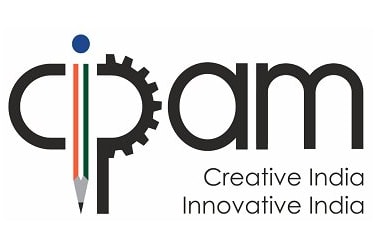 The Cell for IPR Promotions & Management (CIPAM) under the aegis of Department of Industrial Policy and Promotion (DIPP), Ministry of Commerce and Industry, has launched a social media campaign to promote Indian Geographical Indications (GIs). The Cell for IPR Promotions & Management (CIPAM) under the aegis of Department of Industrial Policy and Promotion (DIPP), Ministry of Commerce and Industry, has launched a social media campaign to promote Indian Geographical Indications (GIs).
Its called #LetsTalkIP and is an ongoing movement initiated by CIPAM to make more people aware about the importance of Intellectual Property Rights.
A Geographical Indication or a GI is a sign used on products that have a specific geographical origin and possess qualities or a reputation that are due to that origin.
Such a name conveys an assurance of quality and distinctiveness which is essentially attributable to its origin in that defined geographical locality.
Darjeeling Tea, Mahabaleshwar Strawberry, Blue Pottery of Jaipur, Banarasi Sarees and Tirupati Laddus are some of the GIs.
In the recent past, the government had launched similar initiatives such as #IWearHandloom and #CottonIsCool to promote and revive traditional handwoven textiles.
This time around, CIPAM will be talking about interesting facts and stories related to GIs from across the country on its Twitter handle @CIPAM_India and Facebook Page @CIPAMIndia using #LetsTalkIP hashtag.
The government will also be coming up with various other initiatives to promote registered GIs in the future.
|
▼ President Kovind lays foundation for SAUNI Yojana canal [09-5-17]
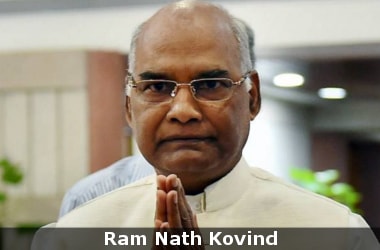 President Ram Nath Kovind, who reached Ahmedabad on 2nd Sept 2017 on a two-day visit to Gujarat, laid the foundation stone of the second phase of link-IV pipeline canal of Saurashtra Narmada Avtaran Irrigation (SAUNI) Yojana at Ghela Somnath in Rajkot district. President Ram Nath Kovind, who reached Ahmedabad on 2nd Sept 2017 on a two-day visit to Gujarat, laid the foundation stone of the second phase of link-IV pipeline canal of Saurashtra Narmada Avtaran Irrigation (SAUNI) Yojana at Ghela Somnath in Rajkot district.
SAUNI is an ambitious project to fill up 115 dams of water-starved Saurashtra region by diverting one million acre feet of floodwaters of Narmada.
The project envisages lifting water from various canals of Narmada project and pump it to these reservoirs by a 1,165-km-long network of giant pipelines.
The estimated project cost is INR 16,500 crore.
The second phase of this giant pipeline canal would begin from Sartanpar minor irrigation scheme near Ankadiya village of Vinchhiya and tail in Dhrafad dam in Visavadar taluka of Junagadh district.
The designed length of the second phase is 147 km.
|
▼ Common Food Processing Incubation Centre for Shallots launched [09-1-17]
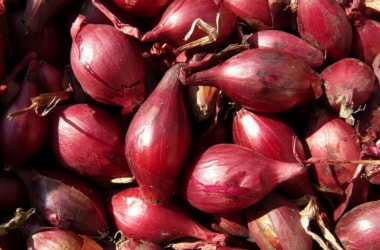 Smt Harsimrat Kaur Badal, Union Minister for Food Processing Industries launched Common Food Processing Incubation Center for Shallots (Small Onions) in Chettikulam village. Smt Harsimrat Kaur Badal, Union Minister for Food Processing Industries launched Common Food Processing Incubation Center for Shallots (Small Onions) in Chettikulam village.
This is in Perambalur District of Tamil Nadu through video conferencing.
Smt Harsimrat Kaur Badal said that it is a historic & auspicious occasion for Tamil Nadu and Chettikulam Village in particular.
She also congratulated Indian Institute of Food Processing Technology (IIFPT), Thanjavur for their initiatives to help double farmers’ income by 2022.
She also said that farmers in Perambalur District are producing 70000 tons of shallots per year in a cultivation area of 8000 hectares, in spite of the increasing difficulty in cultivation due to increase in prices of inputs, unpredictable weather, disease outbreak and not getting adequate prices in the market.
This Central Processing Center for Shallots in Perambalur will ensure that no shallots are getting wasted, increase farmers’ income and also ensure availability of shallots to consumers.
This Onion processing technology should be taken to all parts of India.
Mission Onion: Know More
- Central Food Processing Center for Shallots in Chettikulam, Perambalur District is part of the Mission Onion in improving the lives of Onion farmers in this area.
- This centre will help farmers’ to double their income through value addition. This centre will process Shallots and produce 4 Shallot products viz. Fresh Shallot, Peeled Shallot, Onion Powder, Onion Paste, Onion Flakes.
- IIFPT is working on Mission Coconut which will be launched next year on World Coconut Day (2nd September 2018).
Background- Perambalur district is the hub for small onions (Shallots) cultivation in over 8000 hectares producing around 65,000 to 70,000 tonnes every year.
- Farmers reported massive losses due to conventional methods of handling and storage.
- Stakeholders from this region expressed their need to provide technological solutions to minimize wastage, particularly during seasons with surplus production.
- The farmer producers union which will be involved in this initiative was also launched recently.
|